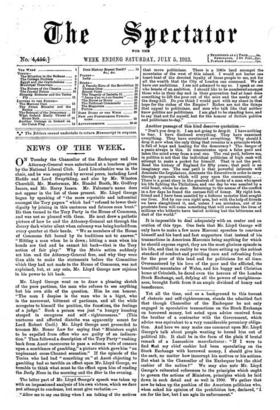Yet all the time, and as a background to this
torrent of rhetoric and self-righteousness, stands the admitted fact that though Chancellor of the Exchequer he not only engaged in speculative transactions on the Stock Exchange on borrowed money, but acted upon advice received from the brother of a contractor with the Government, which advice was equivalent to a very considerable pecuniary obliga- tion. And here we may make one comment upon Mr. Lloyd George's talk about people wanting to hound him out of political life. It shall be in the form of the plain if brutal remark of a Lancashire manufacturer : "If I were to find that my chief cashier had been speculating on the Stock Exchange with borrowed money, I should give him the sack, no matter how incorrupt his motives or his actions. But what is the Chancellor of the Exchequer but the chief cashier of the nation ?" We may also note Mr. Lloyd George's reiterated references to the principles which ought to govern the actions of Ministers, principles which he laid down in such detail and so well in 1900. We gather that now he takes up the position of the American politician who, when asked his opinion of the prohibition law, declared, "I am for the law, but I am agin its enforcement."


















































 Previous page
Previous page